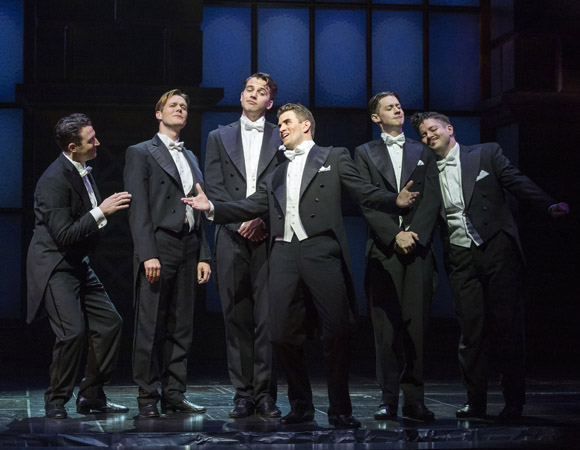Harmony
In this musical co-penned by Barry Manilow, Nazis attempt to silence beautiful music.

(© Craig Schwartz)
In the new musical with music by Barry Manilow and Bruce Sussman, Jews and gentiles find Harmony together, celebrating their differences in a fascistic world that stomps on individuality. The play may still need a little fine-tuning, but as a whole, Harmony is an enriching experience with several memorable numbers. Many flaws can be overlooked due to this production's excellent cast and insightful staging by Tony Speciale.
Harmony tells the story of the six amateur singers who form a "boy band" called "The Comedian Harmonists" during the years Germany suffered through the post-World War I depression. As the group of young men — three Jews and three gentiles — become international stars, their homeland begins to witness the first wave of Nazism as it infects the country. Suddenly, this renowned group with jazz- and Hebrew-influenced music and humor is outlawed, and the boys go from celebrities to criminals. The story is chronicled by the last survivor, Rabbi (played by Shayne Kennon) who, with pride, tracks this rag-tag team of singers through their tribulations and their loves. Being celebrities, the band's lives intersect with some of Europe's most famous, including an unknown Marlene Dietrich, composer Richard Strauss, and Albert Einstein.
Manilow culls from period-specific music with his score, particularly '20s jazz, while infusing the sound with Yiddish folk, Hebrew spirituals, the procession of Germany's oompah a touch of the Weimer vamps of Kurt Weill. The title song is infectious, as is the group's first dabbling with a comedy number, "How Can I Serve You, Madame?" He wonderfully captures the flavor of Marlene Dietrich in "Lost in the Shadows" with such authenticity, one would swear they have a recording of Dietrich singing this exact song.
One stand-out is "Where You Go," is a ballad for two members' wives, Mary (played by Leigh Ann Larkin) and Ruth (Hannah Corneau). It comes at a time where the group precariously attempts to stay together despite the horrors infiltrating their lives, and the wives have become their consciences.
Near the end of act one, Rabbi and the band's composer Chopin (played by Will Taylor) marry their sweethearts, kindhearted Mary and fiery Ruth, respectively. The music in the double wedding scene evokes Fiddler On The Roof without mimicking it and is one of the most touching wedding sequences I've seen in a musical. However, most of the ballads are musically ordinary, lacking the elemental magic that haunts a listener.
Sussman has an ear for clever rhymes. Some of his songs take on new meaning when different characters sing them, such as "This Is Our Time," which starts as a love song for Mary and the harmonist she loves, Rabbi, then evolves into an anthem for the group. Finally it becomes a battle cry for Ruth, a revolutionary trying to convince complacent Germans of Nazi dangers.
When it comes to Sussman's book, however, some of the characters feel inconsistent, like the overly practical band member Bobby (played by Douglas Williams) who, in one scene, kowtows to a Nazi leader and then in the next joins The Comedian Harmonists in an incendiary attack of Nazism called "Come to the Fatherland!" There are moments when the dialogue comes off clichéd or heavy-handed. But like Manilow's music, there is also much to enjoy.
Director Speciale has brought together a tender cast of triple threats, who soar with the melodies, invest pathos and humor in their characters' dialogue, and dance JoAnn M. Hunter's witty choreography with acrobatic precision. Kennon, Williams, and Taylor are matched by colleagues Will Blum as the playful former waiter Lesh, Matt Bailey as the group leader Harry, and Chris Dwan as Erich, the former-doctor-turned-comedian-band-member who hates blood. Separately, they have commanding voices. Together, their sophisticated harmonies and blended voices sound heavenly.
Speciale keeps the show running like a speeding train. The pacing keeps the audience focused on both the show's present settings and the foreboding of what Germany will soon devolve into. The above mentioned "Come to the Fatherland!" number is a feast for the eyes.
The sets by Tobin Ost use visual panels, raising bridges to convey the evolving society of the Third Reich, something mechanical, and the trains, which, throughout the show, remind audiences of the possibility that any of the characters could soon be on a cattle car to Auschwitz. The split-flap display alerts audiences of the characters' locations throughout the evening, but eventually spins out of control, a harbinger of doom.
So many musicals lately are made as commerce, knowing that people will come because they saw the movie or love a band's catalogue of songs, rendering creative writing or inventive direction as unnecessary. Watching Harmony, it is apparent that the authors have immense passion for the project and, despite any issues, their heart shines through.








